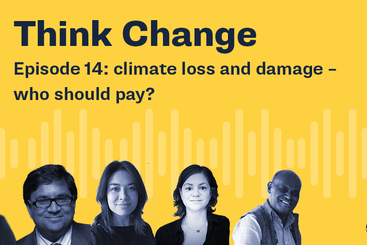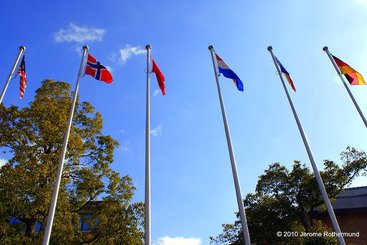For more than a decade the ambiguous language in developed country’s climate finance commitments to developing countries for adaptation and mitigation has been called out. This includes debates about what counts as ‘climate finance’, the ‘fair share’ of climate finance from diverse provider countries, what balance needs to be struck between mitigation and adaptation finance and so on.
This past year, non-Party stakeholders have had unprecedented access to raise their climate finance concerns and propose ways forward. If you have bemoaned the lack of clarity in climate finance commitments, you should be engaging in the technical phases of the Global Stocktake and the New Collective Quantified Goal on climate finance.
Finance agenda items at COP27 have been unsurprisingly tricky. There were a huge number of finance agenda items to be addressed in Egypt and the need to consider how to finance loss and damage from climate change has dominated.
Yet forward-looking deliberations are undermined by recent history. Developed countries are still short of the $100 billion pledge of climate finance by 2020, there is little clarity on how to achieve the doubling of adaptation finance committed at COP26 last year, and efforts crawl on to enhance and simplify access to climate finance and to ensure it has transformational impact.
While Article 2.1c – the third long-term goal of the Paris Agreement that seeks to make finance flows consistent with low-emission, climate-resilient development pathways – didn’t make it onto the agenda at COP27, we are also seeing ever growing calls for financial system reform. There were clear signals from the G20 in Bali on multilateral development bank reform and the various roles that the International Monetary Fund can play in seeking sustainable-debt and green recovery in vulnerable countries. These broader ambitions may yet appear in the cover text from Sharm El Sheik.
Two further sets of deliberations and their associated technical dialogues were relatively low-key at COP27, but deserved more attention:
1. The Paris Agreement’s cyclical ambition ratchet, aka the Global Stocktake:
Article 14 of the Paris Agreement requires countries to assess collective progress toward the purpose and long-term goals of the Paris Agreement every five years. The GST deals with both the provision and mobilisation of finance and climate-consistency of wider finance flows.
Right now, we are part way through the first Global Stocktake (GST) to be concluded at COP28. Technical dialogues commenced in Bonn and in Sharm this year, and will continue into 2023 with strong non-Party stakeholder engagement (though non-Party stakeholder engagement in the consideration phase in the UAE remains uncertain).
The trick of the GST will be turning technical dialogues into political messaging that spurs climate ambition at COP28. While the dialogues are not limited to finance, there remains an opportunity in 2023 for stakeholders to take stock of past climate finance lessons and propose the directionality of change, even benchmarks for progress in providing, mobilising, accessing and delivering climate finance moving forward.
2. The post 2025 climate finance regime, aka the New Collective Quantified Goal on climate finance:
In 2016, Parties decided to set a New Collective Quantified Goal (NCQG) from a floor of USD 100 billion per year, considering the needs and priorities of developing countries, by 2025. In Glasgow last year, the process for deliberating the NCQG was mapped out: four technical expert dialogues would be held each year, for a total of 12.
The objective of the technical expert dialogues is to inform the nature of the NCQG, including its quantitative targets, qualitative targets and any milestones and transparency. Everything is on the table, so the challenge has been to deepen the conversation in any one element of a post-2020 climate finance goal.
The opportunity in 2023 is for non-Party stakeholders to inform the quantity of the NCQG based on the dynamic needs of developing countries, but also explore how best to deliver quality climate finance such as it relates to needs, access modalities, financial instruments, even making all finance flows climate-consistent and to real economy impacts.
While the first Global Stocktake will conclude in Dubai at COP28, the NCQG will continue until the end of 2024. The finance themes of the Global Stocktake and the NCQG cannot ignore the similarity in conversations being had in these two processes. For example, concerns about inequity and unfairness in financing climate action have been raised in both forums. The Global Stocktake can acknowledge these challenges before the NCQG seeks to ameliorate them. Their sequencing is yet another opportunity for these agendas to speak to each other: the NCQG can embed the learnings of the Global Stocktake.
These two processes should be front of mind for all actors, given their lasting implications for trust in the UNFCCC system and the calibre of our climate finance architecture. For non-Party stakeholders, they offer unprecedented opportunities for engagement and influence.
The climate finance community has spent a decade pointing out the flaws and undertaking much-needed work on the transparency of climate finance flows. Now is the time to shift our attention to much-needed solutions. We need ways to make climate finance focussed on people, so that it meaningfully helps achieve development pathways that are low-emission, climate-resilient and socially inclusive. Done right, climate finance can help advance just and nationally appropriate transitions, without compounding growing indebtedness and while reducing the high costs of finance for the most climate-vulnerable.
The task is not easy, but after a decade of complaining, it is time to turn to problem-solving.




